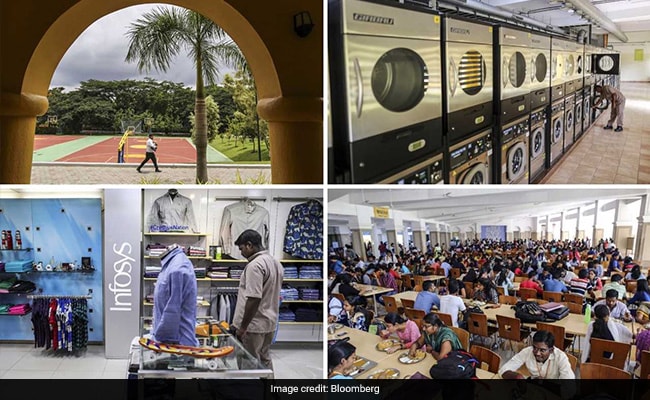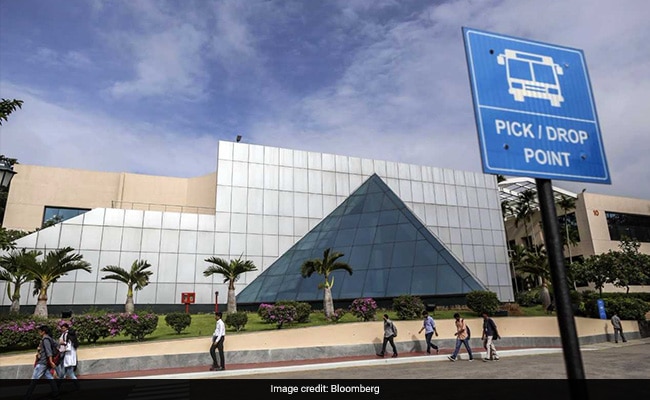
For Infosys competition is stiffening as rivals big and small snag digital services contracts.
When Infosys set out to remake its internal training program, instructors visited flight schools to see how professional pilots are taught to deal with fast-changing situations. That led the outsourcing giant to model classes on flight simulators that teach recruits to work faster, think for themselves and anticipate corporate customers' needs. They're put through multiple scenarios, and no two training days are alike.
"It gets trainees excited and removes the fear of the unknown," says Arpan Patro, who helped design the classes and motivates his students with the aviation aphorism: "Take-offs are optional, landing is mandatory."
The simulator-style drills piloted this summer reflect new thinking at Infosys as the company tries to move beyond the commoditized work of building and managing corporate computer systems. Much of those processes are now automated, and companies like Goldman Sachs Group and Philips N.V. are hiring Infosys and other tech outsourcers for discrete, short-term projects that help them stay current in a world of accelerating change. Chief information officers want projects to go live in weeks, rather than months, and expect engineers to solve problems on the fly.
 Infosys, which recently ousted its chief executive after an internal power struggle and is now searching for his replacement, can't afford to take customers for granted. While the company hasn't lost any major contracts yet, competition is stiffening as rivals big and small snag digital services contracts. Asia's second-largest IT services company needs to change and fast. "As technologies and the outsourcing market change rapidly, skill sets become very critical," says Raja Lahiri, a Mumbai-based partner at the India unit of advisory firm Grant Thornton. The training has to go from coding and programming to design, creativity and customer experience-areas where there's more money on the table. "There's a clear lag in skills."
Infosys, which recently ousted its chief executive after an internal power struggle and is now searching for his replacement, can't afford to take customers for granted. While the company hasn't lost any major contracts yet, competition is stiffening as rivals big and small snag digital services contracts. Asia's second-largest IT services company needs to change and fast. "As technologies and the outsourcing market change rapidly, skill sets become very critical," says Raja Lahiri, a Mumbai-based partner at the India unit of advisory firm Grant Thornton. The training has to go from coding and programming to design, creativity and customer experience-areas where there's more money on the table. "There's a clear lag in skills."
The Infosys campus sits on 337 verdant acres in the palace-dotted city of Mysore, a three-hour drive from the Bangalore headquarters. The facility has 160 classrooms, employs 380 instructors and can train as many as 15,000 people at a time. Just past 8 a.m. on a recent weekday, herds of chattering twenty-somethings trooped into one of many food courts and selected from dozens of subsidized breakfast choices, from rice and lentil dosa crepes to leavened bread parathas.
Breakfast over, they entered all-day classes, where their choices were reduced to two: cope or leave.
This is a big change. Previously Indian outsourcers like Infosys fed thousands of notoriously callow engineering grads into unchallenging "software universities" that spit out grads adept at generic coding but ill-equipped to devise their own solutions, much less champion them to customers. "Back then, after three weeks of training you were ready to be deployed on a client project," says training chief Satheesha Nanjappa, who spoke of his own inculcation in 1993. Nanjappa went on to set up the Mysore center a decade-and-half ago with just one classroom and a single instructor teaching 50 raw recruits.
 Now trainees are put through a 19-week residential program with nine weeks of software industry basics that include studying three programming languages (instead of one previously) and learning to work in teams, followed by an additional nine weeks of intensive specialized training. Besides teaching engineering grads about such emerging technologies as cloud infrastructure, digital commerce and big data analytics, instructors also emphasize "soft skills." These include team etiquette (working cohesively, assigning tasks based on aptitude, pulling together individual pieces of a larger project), how to articulate a point to a room full of customers (preparing beforehand, speaking slowly) and dressing dos and don'ts (no frayed jeans or short skirts).
Now trainees are put through a 19-week residential program with nine weeks of software industry basics that include studying three programming languages (instead of one previously) and learning to work in teams, followed by an additional nine weeks of intensive specialized training. Besides teaching engineering grads about such emerging technologies as cloud infrastructure, digital commerce and big data analytics, instructors also emphasize "soft skills." These include team etiquette (working cohesively, assigning tasks based on aptitude, pulling together individual pieces of a larger project), how to articulate a point to a room full of customers (preparing beforehand, speaking slowly) and dressing dos and don'ts (no frayed jeans or short skirts).
Customers expect Infosys engineers to be able to mix and match technologies in the hunt for solutions. In the past, students might be taught to create a simple search bar for a client; now they're expected to apply search to multiple industry scenarios, from retail to digital payments. "Today applications are not monolithic, and engineers need to have a wide variety of skills," Nanjappa says. "The client expectation is that those on a project know everything."
The self-contained Mysore campus has 10,000 residential rooms equipped with everything a trainee might need-coffee maker, lamp, clothes hangers, laundry baskets and more. There's a bowling alley, a massive library, sports facilities, a supermarket and a four-screen multiplex modeled after Walt Disney's Epcot Center. Campus curfew is 10 p.m., and drinking is forbidden. Those suspected of imbibing are subject to breathalyzer tests and risk being shown the door.
The plush, modern facilities help to soften a gruelling schedule. After daylong classes, recruits often pull all-nighters to complete assignments-much as they would in the real world. Their progress is appraised regularly and those who don't pass muster find their Infosys careers abruptly ended; campus counsellors spend part of their time ministering to stressed-out trainees.
Like an increasing number of Infosys recruits, Rohit Sharma, 23, hails not from a big Indian city like Bangalore or Delhi but a small town in the state of Bihar. The recent computer science grad had long wanted to become an Infosys software engineer and ignored friends' warnings that automation was killing coding jobs. Eight weeks into his training, Sharma is mastering the Python programming language, faring well in the assessments, and says the training has changed him in subtle ways.
Before joining Infosys, he hadn't realized the importance of communication. Now the reticent engineer is learning to meet people and initiate conversations with ease. "I'm learning to code," Sharma says. "I'm also learning to come out of the shell that many people like me from small towns are caught in, and learning to cope in a global industry."
"It gets trainees excited and removes the fear of the unknown," says Arpan Patro, who helped design the classes and motivates his students with the aviation aphorism: "Take-offs are optional, landing is mandatory."
The simulator-style drills piloted this summer reflect new thinking at Infosys as the company tries to move beyond the commoditized work of building and managing corporate computer systems. Much of those processes are now automated, and companies like Goldman Sachs Group and Philips N.V. are hiring Infosys and other tech outsourcers for discrete, short-term projects that help them stay current in a world of accelerating change. Chief information officers want projects to go live in weeks, rather than months, and expect engineers to solve problems on the fly.

Infosys, Asia's second-largest IT services company needs to change and fast.
The Infosys campus sits on 337 verdant acres in the palace-dotted city of Mysore, a three-hour drive from the Bangalore headquarters. The facility has 160 classrooms, employs 380 instructors and can train as many as 15,000 people at a time. Just past 8 a.m. on a recent weekday, herds of chattering twenty-somethings trooped into one of many food courts and selected from dozens of subsidized breakfast choices, from rice and lentil dosa crepes to leavened bread parathas.
Breakfast over, they entered all-day classes, where their choices were reduced to two: cope or leave.
This is a big change. Previously Indian outsourcers like Infosys fed thousands of notoriously callow engineering grads into unchallenging "software universities" that spit out grads adept at generic coding but ill-equipped to devise their own solutions, much less champion them to customers. "Back then, after three weeks of training you were ready to be deployed on a client project," says training chief Satheesha Nanjappa, who spoke of his own inculcation in 1993. Nanjappa went on to set up the Mysore center a decade-and-half ago with just one classroom and a single instructor teaching 50 raw recruits.

Infosys trainees are put through a 19-week residential program with 9 weeks of software industry basics
Customers expect Infosys engineers to be able to mix and match technologies in the hunt for solutions. In the past, students might be taught to create a simple search bar for a client; now they're expected to apply search to multiple industry scenarios, from retail to digital payments. "Today applications are not monolithic, and engineers need to have a wide variety of skills," Nanjappa says. "The client expectation is that those on a project know everything."
The self-contained Mysore campus has 10,000 residential rooms equipped with everything a trainee might need-coffee maker, lamp, clothes hangers, laundry baskets and more. There's a bowling alley, a massive library, sports facilities, a supermarket and a four-screen multiplex modeled after Walt Disney's Epcot Center. Campus curfew is 10 p.m., and drinking is forbidden. Those suspected of imbibing are subject to breathalyzer tests and risk being shown the door.
The plush, modern facilities help to soften a gruelling schedule. After daylong classes, recruits often pull all-nighters to complete assignments-much as they would in the real world. Their progress is appraised regularly and those who don't pass muster find their Infosys careers abruptly ended; campus counsellors spend part of their time ministering to stressed-out trainees.
Like an increasing number of Infosys recruits, Rohit Sharma, 23, hails not from a big Indian city like Bangalore or Delhi but a small town in the state of Bihar. The recent computer science grad had long wanted to become an Infosys software engineer and ignored friends' warnings that automation was killing coding jobs. Eight weeks into his training, Sharma is mastering the Python programming language, faring well in the assessments, and says the training has changed him in subtle ways.
Before joining Infosys, he hadn't realized the importance of communication. Now the reticent engineer is learning to meet people and initiate conversations with ease. "I'm learning to code," Sharma says. "I'm also learning to come out of the shell that many people like me from small towns are caught in, and learning to cope in a global industry."
Track Latest News Live on NDTV.com and get news updates from India and around the world

